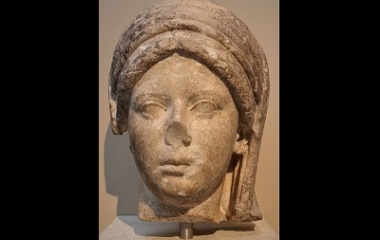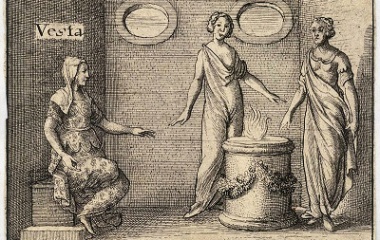Who Is Vesta?
Vesta is the virgin goddess of domestic life, the hearth and the home. The hearth was a very important element of the ancient Roman home, and was the place where the meals were prepared. Seemingly, it is still important today as home life continues to center around the kitchen.
In ancient Rome, a sacred fire burned in the Temple of Vesta in the Roman Forum. The flames were guarded by priestesses, the Vestal Virgins, the only female priests in ancient Rome. They swore a pledge to protect the fire at Vesta’s altar and to keep it burning. Ancient Romans believed the extinction of the fire could bring terrible luck and misfortune to the empire, so their guardianship was very important for the protection of the city.
Each year on the first of March, the eternal fire was renewed. It continued to burn until the year 391, when pagan worship was outlawed by the Emperor. Vesta had her own festival too, the Vestalia, celebrated only by women. They honored her by walking in barefoot procession to the temple where the sacred fire burned.
Origin
The goddess Vesta was the very beautiful first born daughter of the Titans Kronos and Rhea. She was swallowed by her father, along with most of her brothers and sisters. Her brother Jupiter, who later became the chief of the gods, managed to escape the huge appetite of Kronos and freed Vesta and the others. Being the first one eaten, she was the last to be released, so the Romans considered her both the oldest and the youngest of the gods.
Her lovely appearance gained Vesta the lustful attention of many of the male gods. Both Apollo and Neptune proposed marriage to her, but she refused them and appealed to her brother Jupiter to allow her to remain an eternal virgin.
Her wish was granted, and Vesta became the symbol of home and family and an icon of domestic tranquility. She was worshipped in every household in Rome. The Latin word for hearth is focus. , and we use that word today to denote the center of attention or activity. It’s clear that the goddess of the hearth played an important role in the lives of the people. They made sacrifices by the fire, and threw them into the flames to burn.
There were no images of Vesta inside of her temple. It was believed that no bodies could originate from the important element of fire. Her image was placed in an entry, often accompanied by her favorite animal, the donkey. That association was gleaned from her connection with baking, which was of course done at the hearth. Donkeys were the animals that pulled the millstone to grind wheat for the bread. She also held flowers and sometimes a kettle, representations of home life. Unlike other goddesses who appeared in various states of undress, Vesta was always fully clothed.
Vestal Virgins
The priestesses of Vesta took a vow of chastity and spent their time devoted to study and religious rituals. They were selectively chosen for the position when they were under the age of 10, taken from their parents, brought to the temple, and sworn to celibacy for 30 years. The first 10 years were for study, the next to serve, and the last 10 were spent as a teacher. Once the 30 years had passed, the vestal was retired and replaced. She was given a pension and allowed to marry. Generally, the marriages were arranged by the high priest called the Pontus Maximus, who was the overseer of the virgins. Marrying a former Vestal was considered an honor, and also lucky. However, many of the retired vestals preferred not to marry at all, and chose to keep their rights, and live out their retirement on a comfortable nest egg. Notably, the ceremony for choosing the Vestal Virgins was called a captio, which means capture. Seems a fitting title for a 30-year investment in service.
Life as a Vestal Virgin also had its privileges. They were escorted by guardians to all public gatherings and rode in a carriage. At the Coliseum games, they sat in special seats of honor with a great view of the events. Their judgment and character were considered impeccable and they became the trustees of important documents of the city and it citizens. Unlike the other women of the society, they were not subject to the rule of the male head of household, and along with that freedom came the right to own property. They also had the right to vote. The penalty for harming a Vestal was death.
Since they were considered to be married to the state, a sexual relationship by a Vestal was considered treason. The punishment was to be buried alive in an underground chamber near the gates of the city. Since physically harming a Vestal was a crime, they were left to die with a few days of food and water. This horrific punishment wasn’t something that happened very often, but there were a few cases over the one thousand years of the Order of Vestals.
Vestal Tuccia, accused of breaching her vow of chastity, was condemned but she performed a miracle by carrying water in a sieve and that got her off the hook. Vestal Postumia was admonished for her inappropriate manner of dress and merriness unbecoming to her position, but she also managed to escape the burial chamber. The men accused with those who were actually found guilty of breaking their chastity were whipped to death.
Modern Influence
Christianity eventually took over the pagan religion in Rome, but the flames of Vesta’s eternal fire continued to burn. Candle lighting ceremonies still prevalent today are reminiscent of the traditions of Vesta. The Order of the Vestals ended, but a new order of less powerful celibate priestesses was formed: nuns.
As one of very few goddesses immune to the spells of Venus, the goddess of love, Vesta could not be forced to love anyone. It’s interesting that an unmarried childless virgin represented home life in ancient Rome. Nevertheless, a focus on family values and dedication to home life is a valued attribute today, in both Christian homes and throughout society as a whole.










